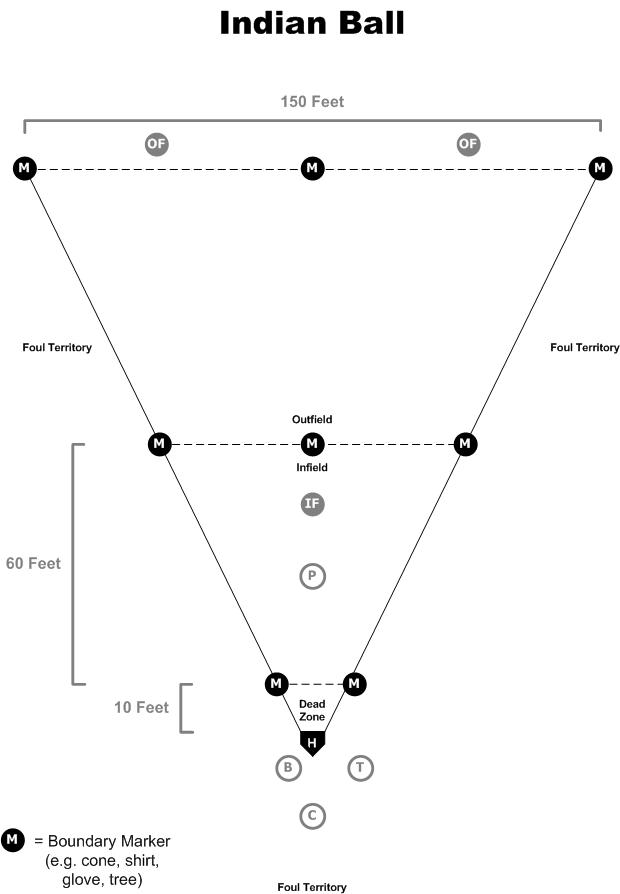| ChrisOLeary.com > Indian Ball: The Game and Rules |
|
For reasons I didn't expect — but I assume is related to the COVID-19 shutdown — my piece on the game of Indian Ball... ...which is a stripped-down version of baseball that can be played by a few as three people, is suddenly getting TONS of hits. I guess people are trying to figure out how to scratch their baseball itch in a world of social distancing. Given the interest, and as the comissioner of the AIBAA, let me explain how to play the game of Indian Ball. Indian Ball: The Game & RulesIndian Ball is a game I was taught as a kid.*** It is/was to St. Louis what stickball is/was to New York. It's a way of playing baseball/softball — or a stripped-down form of it — if you don't have 18 players. *** I didn't come up with the name, which I never thought of as racist, but very well may be, so don't blame me if it is. NUMBER OF PlayersYou could technically play Indian Ball with 2 players, but it works better if you have at least 3. In the case of 3 players, you rotate. Outfielder then Infielder then Batter. Batter goes to the Outfield after each Inning. THE FIELDThe field is TRIANGULAR. The size of the field — mainly the width, but also the depth of the Infield line — depends on the number of players. MarkersBoundary markers can be shirts, soccer cones, extra balls, etc. OUTS & StrikesYou can play the game with 3 OUT and 3 STRIKES or adjust that number up or down to even things out, slow things down, or speed things up. I often played with 5 OUTs and 3 STRIKEs. BALLS only apply to games in which you pitch to your teammates. In that case, we usually play with just 2 or 3 BALLS per at bat. Balls & Strikes2-3 STRIKES is an OUT. 2-4 BALLS is an OUT. ZonesI don't remember exactly what I was taught, but I play the game with three zones. Dead ZoneAny ball that ends up in here counts as a STRIKE. That's to prevent stupid stuff like bunting that is cheap and slows down the game. InfieldAny ball that is caught or fielded CLEANLY in this zone is an OUT. In some cases, fielded CLEANLY can mean it's picked up before it stops rolling. But that requires honor from the players, and not everyone can handle this rule. The width of the Infield and Outfield, and the number in each zone, depends on the number of players. You need at least ONE Infielder, and fewer Infielders than Outfielders. You may want to limit the number of Infielders to give weaker hitters a chance and to encourage them to work on directinal hitting (hitting the ball where the Infielder isn't). OutfieldAny ball that is caught here is an OUT. And ball that stops rolling here, in front of an infielder, and is FIELDED CLEANLY is a SINGLE. Any ball that is not FIELDED CEANLY by an outfielder is a DOUBLE. Any ball that rolls past an outfielder but is picked up while it's still rolling is a DOUBLE. Any ball the rolls past an outfielder and is NOT picked up while it's still rolling is a TRIPLE. Any ball that is hit OVER the head of an outfielder, no matter how deep they are standing, is a HOME RUN. Foul TerritoryAny ball that ends up in here counts as a STRIKE. Base runningThere's no baserunning in the basic game of Indian Ball. However, I've experimented with adding base running ala cricket or with two or more bases. That can be used to determine the movement of invisible runners; they have to be forced in. You can also use base running to encourage everybody, especially outfielders, to hustle to get balls. The BatterWhen I was a kid, we'd play either by tossing the ball to yourself or having a teammate pitch the ball to you. I've also played it used a Batting Tee. Scoring & InningsYou count runs and play as many innings as you can. Often until you run out of light. Speeding Up The GameWays to speed up the game, ensure that people hustle, and make good throws...
Minus RUNsOne modification I've made is that the defensive team can negate all runs, and get an OUT, by throwing (relaying) the ball between every member of the defensive team in a set amount of time (e.g. 5-15 mississippi's). That leads to better throws in from the outfield and speeds the game up. It keeps the defense from just chucking the ball in at random (in frustration/anger). To make that harder, the last infielder may also have to bowl the ball at a bat stretched across the plate and hit the bat (without the batter catching the rebound). |
| about | contact | copyright | sitemap | liability policy |

